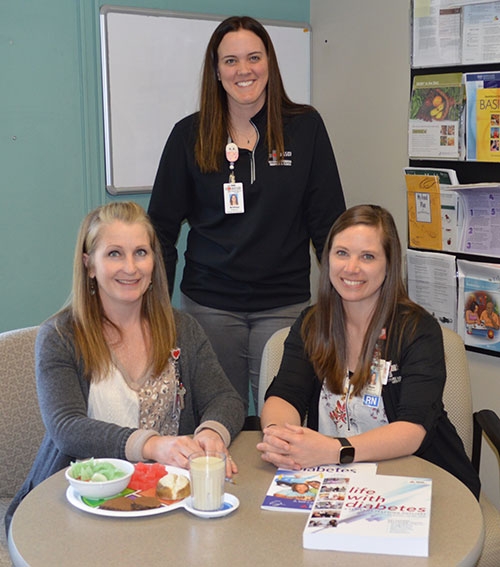You are here
Home ›April is Defeat Diabetes Month; Let’s defeat diabetes together

Diabetes Education Team at VMH ... April is Defeat Diabetes Month. Let the Diabetes Team at Veterans Memorial Hospital help. Pictured above, seated left to right, are Brandy Strub, Registered Dietitian and Angie Mettille, RN, Diabetes Educator, with Brittany Snitker, Pharmacist and Diabetes Educator, standing in back. Submitted photo.
April is Defeat Diabetes Month. The Good News and Bad News...
The “bad news” is there are more than 250,000 Iowans living with diabetes, and that number continues to rise. Although researchers worldwide continue to work towards eradicating diabetes, a cure has not been discovered. Type 1 Diabetes continues to require frequent insulin injections or a pump for survival, and Type 2 Diabetes can be controlled by oral medication, injections, or insulin.
The “good news” is both types of diabetes can be improved immensely through lifestyle modifications, such as moving your body, including fruits, vegetables, and whole grains within your meal plan, dealing with stress in healthy ways, and getting adequate, quality sleep.
Medications for treating diabetes evolve continuously. They have become more effective in lowering blood sugars, but also proving that they can actually prevent heart and kidney disease, which is definitely “good news”. Medications can also be used in combination to address the multiple different body systems that are often responsible for elevated blood sugars. Some insulins are even extended release, extending the duration of action and decreasing peak effects, causing more stable blood sugars.
More “good news” is the technology that has become available to people living with diabetes. If you check your blood sugar by poking your finger, your glucometer is more accurate than it was 10 years ago (as long as you have received a new one). The machine also likely requires less of a blood sample size to provide a glucose reading, which means the needle depth required is less. Continuous Glucose Monitoring (CGM) is another tool that has made managing diabetes easier for many people, by eliminating the need to poke the finger multiple times per day. More insulin pumps now have the ability to communicate with a CGM for improved insulin dosing and blood sugar control.
Now the “bad news” about technology, is that it can often be expensive and insurance does not always cover the newest tools for everyone with diabetes.
Although it may be “bad news” that diabetes is incurable, the “good news” is there are many ways to improve blood sugar control, overall health, and life expectancy by learning the skills needed to make the necessary lifestyle improvements. In fact, not all people living with Type 2 Diabetes will need to take medications to control blood sugars if they are able to make the necessary adjustments to their daily life. Even if a person is started on medications at their diagnosis, it is very possible they will not need those medications long term, if they can receive the education on how to manage the disease.
A diabetes educator can help you develop a plan to stay healthy and give you the tools you need to navigate the various curveballs that diabetes can throw at you. One thing is sure - the more support you have, the more successful you can be. It is often said, it takes a village to raise a child. This is also true for diabetes; it takes a village to control diabetes. That village, or healthcare team, consists of your physician, your physician’s nurses, a nurse diabetes educator, dietician, pharmacist, podiatrist, optometrist and dentist, just to name a few. Diabetes education should be a part of your yearly, or more often if needed, routine.
The best time for diabetes education is:
1. When you’re first diagnosed with diabetes.
2. Annually to review your treatment plan and make improvements as needed.
3. Whenever complications arise such as vision changes, cardiac disease or stroke, kidney disease, neuropathy, persistent infections or wounds that are not healing as they should.
4. During changes in your healthcare treatment, such as medication changes or major life events that affect how you manage diabetes - physically, socially, mentally or financially.
Whatever problem is causing your blood sugars to be too low or too high, your diabetes educators can help you design a specific plan that will work for you. You are not expected to navigate life with diabetes alone, which is “good news”. Education and lifestyle improvements, even subtle, can make a big difference on your quest to defeat diabetes. Let the VMH Diabetes Education Team help you in your battle by calling 563-568-3411 ext. 172.

